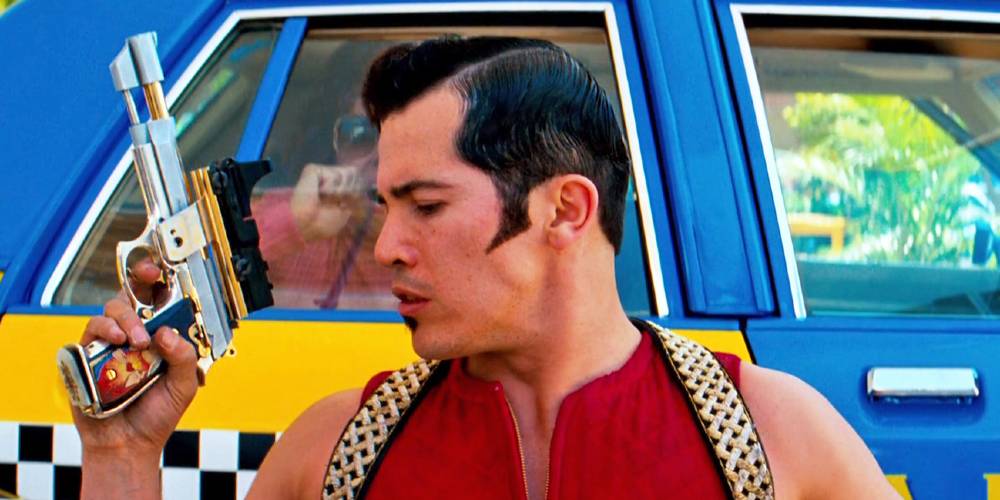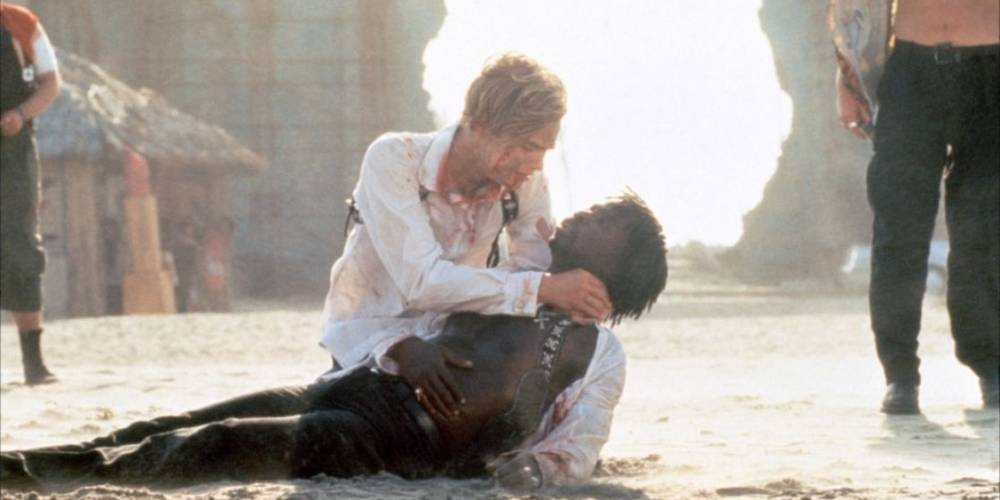Baz Luhrmann’s hyper-stylized take on Shakespeare makes some odd choices, but not in the casting of some of its key characters
If you’re a Shakespeare purist, Baz Luhrmann’s 1996 rendition of Romeo and Juliet might make your skin itch. Luhrmann’s signature frenetic style would seem ill-suited to the most famous romantic tragedy of all time, and, indeed, the traditional text recited in a hyper-contemporary setting, where even the Priest has a giant Celtic cross tattooed on his back, is often jarring. But it turned out to be a perfect fit to illustrate the noisy melodrama of first love and was one of the most successful films in the 90s trend of stylish, modernized adaptations of the Bard. Despite its detractors, it became, for Millennials and Gen Z, the most beloved, familiar rendition of it, even used as a supplement in schools.
Venice Beach is the stand-in for “fair Verona,” and it’s such a run-down. sketchy dump that it makes the long-standing feud between the Montagues and the Capulets even more pointless. The feud is between the patriarchs of both families (Brian Dennehy and Paul Sorvino), but, as these things usually go, the endless, ugly battle is fought by the younger generation, who likely don’t even know what they’re fighting about. The Montagues are a bunch of loud, Hawaiian shirt-wearing assholes (one of which is played by a pink-haired Jamie Kennedy) whose idea of a good time is driving around in their flashy car and catcalling women. Their counterparts, the mostly Latino Capulets, are smoother and more sophisticated, and their leader, Tybalt (John Leguizamo), isn’t above aiming a gun at a child’s face to make a point. Still, for both gangs, despite all their bluster and posturing (and waving guns branded “Dagger” and “Rapier”), when it comes down to actual lives being in danger everyone suddenly starts looking real uncertain, even scared. They are, after all, just a bunch of kids, young adults at best, forced into conflict with each other for reasons that have nothing to do with them.

Somewhat removed from all this (at least at first) is Romeo (Leonardo DiCaprio, so young he looks like he was hatched from an egg), who makes the fateful decision to attend a costume party at the Capulets’ home. It’s there that he meets Juliet (Claire Danes), unaware that she’s a Capulet (nor does she know that he’s a Montague), and they fall in immediate, mad love, the kind of love that makes you do irrational things like decide to get married the very next day. That meeting sets off a chain of tragic events that high school students have read and cried over for generations, as many more will in the future.
Romeo + Juliet is a study in creative capital-C Choices. Some are a matter of practicality, like changing Juliet’s would-be suitor Paris (Paul Rudd, on the verge of stardom) from another victim of the feud to just a good-looking dipshit who disappears halfway through the story. Some are stylistic, like using up-to-the-minute songs like Garbage’s “#1 Crush” and the one-hit wonder “Lovefool” on the soundtrack, setting the timeless themes of the play firmly in the mid-1990s. Some are just baffling, like portraying the Capulets as Latino in a nod to West Side Story, but casting two Italian-American actors (Sorvino and Diane Venora) doing some interesting accent work as their scions, and a lily-white actress as Juliet. We shan’t even get into Miriam Margolyes in brownface as Juliet’s nanny.
To an extent, its detractors have a point: Romeo + Juliet is messy, relying too often on cartoonish zooms and actors choosing to scream their dialogue instead of merely speaking it. Whatever sins it commits are forgiven, however, thanks to the casting of two key characters.
John Leguizamo doesn’t just have panache as Tybalt, he is panache. On anyone else, his high-heeled boots and fussy, Virgin Mary-adorned vest might look campy, but Leguizamo is a sleek and sexy counterpart to the goofy, boyish Montagues. He’s referred to as the Prince of Cats because he’s elegant but dangerous and cannot be trusted. If you’re not quite sure what that means, at the Capulets’ party he wears devil horns. Though he had been known predominantly for comic roles up to this point, Shakespearean dialogue rolls right off Leguizamo’s tongue, and he brings incredible dramatic flair to his performance, dropping to his knees and kissing his gun in the middle of a shoot-out.
Harold Perrineau as Mercutio recites the dialogue as if he’s been reading it his whole life, twirling a hand cannon around his finger like an old-time Western star. His performance is particularly remarkable when you realize it’s his first appearance in a major film, Merctio is introduced wearing drag, pulling a crumpled invitation to the costume party from under his skirt and handing it to Romeo. Later, as part of Romeo’s wild drug-induced hallucination, he lip-syncs the disco classic “Young Hearts Run Free” (a clever choice given its cautionary lyrics). Like Tybalt’s introduction, in a less assured actor’s hands the scene would be silly, and yet you can’t take your eyes off Perrineau.
We know that a clash over Romeo and Juliet’s forbidden romance is inevitable, and the real tragedy is that Mercutio doesn’t even have skin in the game. He’s neither a Montague nor a Capulet, and thus there’s no one’s honor he’s been programmed since birth to defend. But he is Romeo’s friend, and when Tybalt’s smoldering anger boils over into uncontrollable rage, Mercutio steps up to defend him, without the tough guy posturing. He’s the first victim to fall over this stupid, meaningless feud, and Mercutio’s rendition of the “a plague on both of your houses” speech as he lies dying emphasizes the futility of the situation. He’s angry and he’s sorrowful, and he doesn’t spare Romeo from blame.

Tybalt, for his part, is immediately regretful of what he’s done. There’s no way the situation can be saved or turned around, and he will have to pay for Mercutio’s death with his own life. All that sleek dangerousness that made the Montagues fear his mere presence is gone, and you can see it in his eyes too: I’m sorry, this is so stupid. Why did any of this have to happen?
For its occasional lapses into style over substance, just on Leguizamo and Perrineau’s performances alone, Romeo + Juliet gets to the heart of what makes it a tragedy. It’s right there in the opening lines, recited here by a detached news reporter: “Two households, both alike in dignity…from ancient grudge break to new mutiny, where civil blood makes civil hands unclean.” This old, drawn-out conflict, maintained solely because of ego and obstinance, has brought needless death, and now everyone has paid for it.